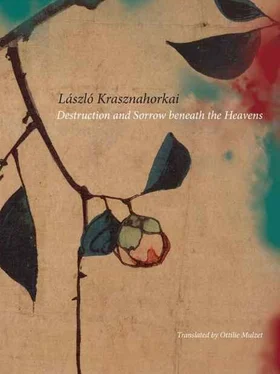And this is the point from where there is no going on. Stein senses that if he does not want to irrevocably offend Yao, it would be better for him to stop. The clamour of the hordes of guests in the restaurant almost causes him physical pain. They have hardly touched their food. And clearly Yao has had enough of this conversation. Through the interpreter they discuss the weather, the unbelievable speed of Shanghai’s development, Yao asks if they have seen Pudong yet, yes, of course, we’ve seen it, he asks if they have bought any fashionable clothes or electronics yet, because this is the place to do so, the interpreter says, no, we haven’t; you should buy something, at least something for yourself, Yao banters with the interpreter a little, he is a young man who would definitely be interested in the goods of Shanghai, known all over the world. The interpreter answers that he is very grateful for the advice.
He lives here. He knows it’s hopeless.
3. In the Captivity of Tourism
In the province of Jiangsu, south of Taihu,[67] roughly in the territory bordering Shanghai, Hangzhou, Shaoxing and Taihu, exists an enormous, timeless empire. It is entangled with canals and rivers and innumerable villages, and the entire area is so densely interwoven and so complicated that, apart from the locals, no one can find their way. If a foreigner sets off in this region, he immediately encounters these canals winding back and forth, and the tiny lakes turning up here and there, so it is no wonder if after the first few kilometres he loses his way and, after a short time, he has absolutely no idea where North and South are situated: he has no idea, which means that — due to the unbelievably complicated bus routes, incomprehensible to the uninformed — only quick perception can come to his aid; not to force any earlier-planned destinations, whether gleaned from maps or friendly advice, but to be content with whatever happens to fall into his lap: because behind nearly every third bus station is concealed a little village, and that village is evidence that time is not continuous — László Stein and his interpreter gaze upon the first such village, dating perhaps from the time of the Ming dynasty, and having remained there ; because, as the saying goes, time has stood still for this village, so they can arrive at about six in the evening, twilight is falling, the weather is uncommonly mild and. . there, right in front of them, is the end of the Ming era, Stein thinks to himself, and my God, he says to the interpreter, as they gaze at the roofs of the tiny houses snuggling up to one another — seen as yet from a distance, from the bus station — they gaze at the rhythm of the densely set blue and grey of the ridge tiles, my God, he keeps repeating, but he can’t bear to continue the thought, because he simply cannot find any words, because he can’t believe that this is possible, that here is Shanghai only 80 kilometres away, here is Shanghai 60 and 40 and 100 and 120 kilometres away, because Shanghai is everywhere, the empire of Shanghai is all around, with its dazzling speed and its distressingly incorrigible corruption, and yet this is here: they set off on a well-trodden footpath along which a young local woman with a little girl by her side amiably guides them; here is the Ming dynasty — or ‘at the max’, the interpreter says, correcting his enthusiasm, the beginning of the Qing![68] — come this way, the woman shows the route smilingly and then says something which the interpreter doesn’t completely understand, but never mind, the two Europeans are incapable of engaging with this friendly young woman and even more friendly sweet daughter who is enchantingly shy, because there is the Ming dynasty, frozen in time, or ‘at the max’, the early Qing. This world had existed only in Stein’s imagination, as for him there never could have existed a place — down to the last minute detail — such as he is looking at right now: it existed only and exclusively in his imagination, constructed entirely in his head, building by building, gate by gate, street by street — constructed from the fairytale vistas of novels, poems, stories, drawings and paintings — so that, as a matter of course, he never believed that it could be possible that one day, taking the bus from somewhere, as it happens from Shanghai, because he happened to hear from Yang Lian at one point that, not very far from where they were staying, the so-called water-town pearls could be seen tucked away amid the canals, he never believed that this could all just suddenly emerge from reality, and he is hardly able to grasp this, they make their way among the little houses, and they set off on the narrow walkway, and, really, it isn’t as if they had simply arrived in a village of the Ming or Qing era but as if they had wandered into a marvellous dream taking place exactly at that time, the time of the Ming or the Qing, because nothing has changed here, says Stein to the interpreter who is just as astonished, well, how is this possible? — they look at each other and then they say goodbye to the young woman and the little girl who have just arrived at their own house, and who amicably invite them in for a visit, but for now they decline the invitation, since they want to remain outside, that is, remain inside the dream, because that’s what it is — no matter how much they touch the saltpetre walls, no matter how much they sense the smell of the water from the canals running through the middle of the narrow streets, no matter how much they see the locals lingering in front of the houses, or as a woman, just now, washes clothes down in the canal, because even then it is only a dream: László Stein looks at these enchanting tiny streets on either side of the narrow canals, he looks at the strongly arched, tiny stone bridges under which long black small boats are borne away, real and yet not of this world; he looks at the decaying doorways, the open gates and the corridors inside, not even a metre wide, yet unbelievably long, dark and enclosed, in which light appears only as a tiny rectangle at a distant end, so tiny and so distant, light coming from a courtyard or who knows from where; he looks at all this and he immediately informs the interpreter that they should stay here, every other plan is senseless, they are not going anywhere, yes, they will stay here, replies the interpreter in the greatest agreement — and they just walk on and on in the long evening in this village known as Zhouzhuang, and they fall into the sweetest kind of melancholy as a woman comes out from one of the houses and calls out to her children playing on the banks of the canal that dinner is ready; there is some kind of inexplicable unearthly peace in Zhouzhuang, old people sit on a bench, and not with the usual suspicion but, in the friendliest of cases, they take a good long look at the two Europeans, as perhaps could only be natural in a dream such as this, they look at them, then serenely acknowledge their greeting — Where are we? Stein asks the interpreter, is this possible? and they go on, evening begins to fall, the streets slowly begin to empty, and they too are left to themselves, but it is still not completely dark, the sky is clear, there is a full moon above them and a mild breeze is blowing, they can see well in the obscurity, and they cannot stop looking and looking at the end of the Ming era, or, as the interpreter now banteringly adds, ‘at the max’, the early Qing. They find only one place open, a teahouse where, instead of walls, a wonderful glazed latticework wall, varnished crimson-brown, faces the canal and the walkway of the tiny street, and inside an old couple sits idly behind the counter, watching television, and they look up as soon as the guests come in, and then place a pot of excellent, if expensive, Longjing tea in front of them, and the two guests happily sip away from the beautiful teacups and listen to the owner, Zhang Jihan, as he begins to relate: Zhouzhuang, well, yes, Zhouzhuang is in its essence untouched, they can see — he points all around — that this doesn’t mean his little teahouse but the entire village, no one here would think of damaging what is old, ever since the time of Shen Wanshan, that was a long time ago. But still, since when exactly? interjects Stein. Well, a very long time ago, the old man smiles, so this Shen Wanshan began to supply grain and this and that on River Baixian to the northern part of village — the old man points to the north — well, since then our life started up here, he nods a little wearily, as if he has been sitting here since then, then people diverted the water from the Great Canal to the west, he continues to relate, and the water from River Liu to the north-east, and that is how we got going here, that is how the Ancients founded Zhouzhuang, and so it is until this very day, he says, and very great gentlemen built such houses here that they came from Yangzhou and Suzhou to admire them; Shen, isn’t it, he says as if to himself, then the Zhang family, then the Xu family, then came Liu Yazhi or Chen Qubing, or famous scholars such as Zhang Jiyang, the old man fluently narrates, as if he were the local chronicler familiar with every detail, the two guests happily sip the steaming, aromatic tea, the old man gestures that there is no need for them to pay this time, and brings new leaves and fills the cups again, and they don’t have the strength to get up, and he leaves them to themselves, for they have no strength to leave this person here with his wife, with his stories, to leave this magical building with its doors open onto the canal and the village, darkness has fallen now, and they dare not budge an inch lest it should emerge that the tiniest movement is enough, that this is all just a dream, and — poof! — it will be gone.
Читать дальше












